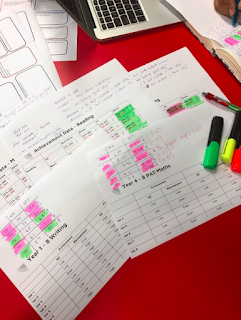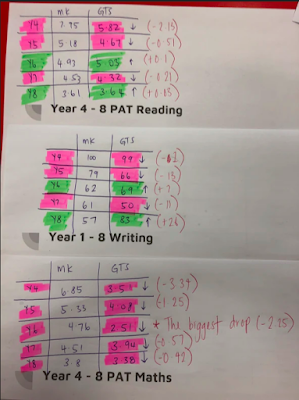Today, my fellow CoL within schools teacher, Poto and I decided to sit down and thoroughly look through our 2018 End of year assessment data.

Thoughts surfaced, wonderings came to mind and questions were asked. The discussion we had was very intriguing and informative. Here's what we found:
What did we notice:
Reading:

1. There was an increase in no. of students achieving at WELL BELOW
2. Increase in those achieving ABOVE expectation
3. Maori - achievement much lower compared to other ethnicities
4. Decrease in no. of students achieving BELOW
5. Decrease in no. of students achieving AT, but increase in ABOVE.
Writing:
1. Decrease in BELOW, but increase in WELL BELOW
2. Decrease in AT, but increase in ABOVE.
Maths:
1. Increase in BELOW and ABOVE, Decrease in WELL BELOW and AT
2. Increase in ABOVE,decrease in AT, Increase in BELOW apart from Pasifika and girls.
What judgements overtime can we make:
From the findings we discovered, we came up with many questions and discussed possible next steps for our Inquiry focus here at Glen Taylor. Some of the questions we had were:
- OTJs vs Formative assessments - what provides more insight? What is being measured?
- Did the ALL intervention in 2018 for Writing, prove to make discernible impact?
- How consistent are the teachers in evaluating formative assessments?
- What changes can we make in our Teacher practice to ensure the resources and materials we use in class are effective?
- Mixed ability grouping in maths vs ability grouping? Which is more effective?











